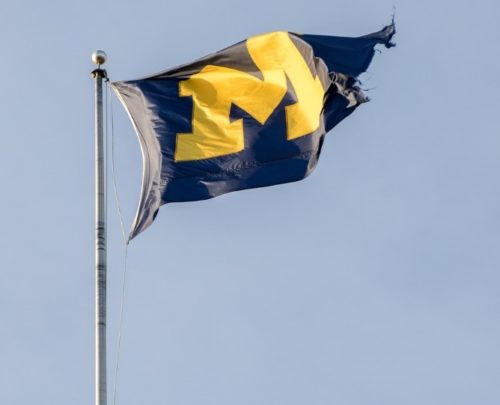
Photo courtesy of Pixaby
By Stephen Hodzic, Staff Writer
Freedom of speech is considered one of the most fundamental rights of a citizen of the United States.[1] The First Amendment of the Constitution specifically prevents an infringement of those rights by any branch government, with exceptions for threats, blackmail, and the like.[2] As anyone with social media likely knows, while your speech is protected from retaliation from the government, private individuals have no such restriction. While the distinction between a private citizen and the government may seem to be clear, the recent activities of certain educational institutions have been questioned in situations involving First Amendment-protected speech and what is considered retaliation for that speech. A recent case involving the University of Michigan and its students involved one example of freedom of speech concerns in institutions of learning, though many other examples can be found readily in daily headlines.
In May of 2018, Speech First, a nonprofit group, filed for an injunction on behalf of three anonymous students from the University of Michigan, who claimed that their freedom of speech rights had been “chilled.”[3] The students expressed concerns about discussing their views on a variety of topics, including gun rights, abortion, welfare, gender identity, and affirmative action, among others.[4] The Speech First lawsuit focused on the university’s “Bias Response Team” which, according to the suit, acts with the “implicit threat of punishment and intimidation to quell speech on campus,” as an appellate court would later hold.[5] The University reported otherwise, stating that the Bias Response Team was available to talk to students who felt they had been a target of bias, and the group had no power to discipline perpetrators or investigate claims further; the group will “simply council [sic] and advise.”[6]
Speech First sought an injunction to prevent the University of Michigan from taking action to investigate or punish students for violations of what the university defined as harassment or bullying as set forth in the University’s Statement of Student Rights and Responsibilities, as Speech First argued the definitions given by the university were too vague and unclear, which could allow for inconsistent punishments for students.[7] Speech First also sought to also prohibit the University from using the Bias Response Team to investigate, threaten, or punish students (whether through formal or informal punishments) for alleged bias incidents.[8] The Eastern District of Michigan District Court found that while there may have been evidence of overbreadth in the University’s definitions of bullying and harassment, to the point where there was the potential for a “substantial chill” on a student’s speech, Speech First was not able to establish a concrete harm had occurred or was imminent.[9] Additionally, the District Court found that there was no evidence of the Bias Response Team engaging in punitive actions, nor engaging in investigations regarding biased or bullying behaviors.[10]
Speech First appealed the District Court’s holding to the Sixth Circuit Court of Appeals and presented their arguments on May 2nd, 2019. On September 23rd, 2019, The Sixth Circuit remanded the case back to the district court to reconsider Speech First’s motion for an injunction to challenge the Bias Response Team and the University’s bullying and harassment policy.[11] The court noted that after the lawsuit was filed, the University of Michigan had changed part of its definition of harassing and bullying, and instead of using the Merriam-Webster definition, it used the definitions taken from Michigan state law, which Speech First did not claim to be unconstitutional.[12] The court discussed the actions of the Bias Response Team, which included taking information about a “bias event” occurring on campus and the actions that are taken to address the incident; this information is then made public on a webpage, though the events are anonymized.[13] While the Bias Response Team had no official punitive powers, they could make a referral to others in the school, as well as to law enforcement. The court found that the ability to make these referrals, to law enforcement or to other school authorities, constituted an objective, concrete consequence that chilled freedom of speech.[14] While the referral itself was certainly not a punishment, the referral had the potential to lead to a punitive action.[15]
As mentioned previously, the University of Michigan had already taken steps to change the definitions that were alleged to be overbroad in the initial suit, which was also the same day the Justice Department filed a statement of interest in the case.[16]
[1] Lovell v. Griffin, 303 U.S. 444, 58 S. Ct. 666 (1938)
[2] https://www.freedomforuminstitute.org/first-amendment-center/primers/basics/
[3] https://www.mlive.com/news/ann-arbor/2019/09/court-vacates-ruling-favoring-university-of-michigan-in-free-speech-lawsuit.html
[4] Id.
[5] Id.
[6] https://www.michiganradio.org/post/university-michigan-files-response-free-speech-lawsuit
[7] https://www.michiganradio.org/post/lawsuit-claims-um-disciplinary-code-curbs-free-speech
[8] Speech First, Inc. v. Schlissel, No. 18-1917, 2019 U.S. App. LEXIS 28625 (6th Cir. Sep. 23, 2019)
[9] Id.
[10] Id.
[11] Speech First, Inc. v. Schlissel, No. 18-1917, 2019 U.S. App. LEXIS 28625 (6th Cir. Sep. 23, 2019)
[12] Id.
[13] Id.
[14] Id.
[15] Id.
[16] https://www.detroitnews.com/story/news/local/michigan/2019/02/19/free-speech-policy-stirs-controversy-university-michigan/2846333002/